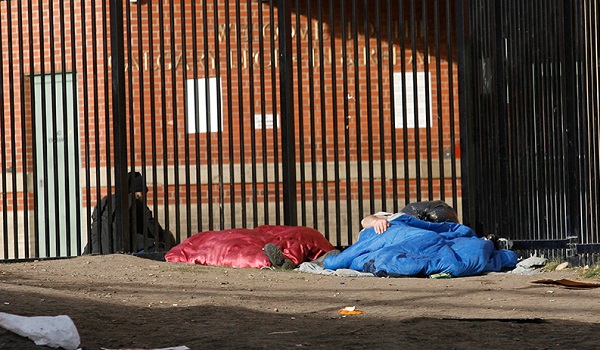Governments need to provide more funding for municipalities to tackle homelessness, opioid crisis, Mayors say
Both the Ontario and federal governments need to provide more than the current piecemeal funding they hand to municipalities to tackle homelessness, drug addiction and mental illness, a coalition of the province’s mayors says.
Ontario’s Big City Mayors, a group of the leaders of the province’s 29 largest cities representing about 70 per cent of the population, launched a new public campaign on Thursday to call for expanded, predictable funding from both provincial and federal governments to deal with the worsening crisis.
“Ontario municipalities are struggling. We’re struggling with an issue that we can’t solve on our own,” said Marianne Meed Ward, the mayor of Burlington, west of Toronto, who chairs the Big City Mayors group. “What is happening on our streets across this province is an unprecedented humanitarian crisis.”
Ms. Meed Ward, flanked by her counterparts from Waterloo and Guelph, told a press conference at Queen’s Park that while the province and Ottawa have come forward with added funding for things such as supportive housing units for homeless people who need addiction counselling or other services, it has been nowhere near enough. The funding has also been largely ad-hoc, she said, making it hard for municipalities to engage in long-term planning.
And the problem, she added, has been growing faster than funding to fight it.
She and her fellow mayors say the scale of the crisis requires much more money and much more action. Without it, she said, more homeless people will die on the streets, and residents won’t feel safe in parks and downtowns across the province. More than 2,500 people now die of drug overdoses a year in Ontario alone.
Ms. Meed Ward called on Ontario’s Progressive Conservative government to appoint a “single point person” with the powers and the funding needed to address the crisis, saying that Michael Tibollo, the province’s Associate Minister for Mental Health and Addictions, lacks the needed clout to co-ordinate efforts across different government departments.
“Though he has the title, he doesn’t have the ministry support and the staff and the funding,” she said of Mr. Tibollo. “So that’s a place to start.”
The new point person, she said, should strike a task force, made up of municipal representatives, health care experts, business leaders and others to develop a “made-in-Ontario action plan.”
The mayors also want money for around-the-clock crisis centres to relieve pressure on hospital emergency rooms and are calling for new, unspecified “tools and resources” to “transition” people living in the estimated 1,400 homeless encampments across the province to “more appropriate supports.”
In an e-mailed statement, Bianca Meta, a spokeswoman for Ontario Minister of Municipal Affairs and Housing Paul Calandra, did not directly address the mayors’ concerns about a government point-person or the episodic nature of provincial funding.
Ms. Meta pointed to recent three-year deals struck to provide over $240-million for shelter and homelessness programs in Toronto and Ottawa and said the province had boosted its annual allotment for community and supportive housing by 40 per cent, to $700-million, while pledging $396-million over three years for mental health and addiction services in its recent budget.
She also echoed the call for more federal funding, blaming unspecified policies enacted by the federal government for increasing homelessness.
Yuval Daniel, a spokeswoman for Ya’ara Saks, federal Minister of Mental Health and Addictions, also did not directly address the issue of piecemeal funding in an e-mail to The Globe. She said Ottawa had spent $1-billion since 2017 on the opioid crisis and pointed to the federal government’s three-year health care deal with Ontario, which includes $1.2-billion for mental health and addiction services. Ottawa has also announced a $150-million “emergency treatment fund” for municipalities to address the overdose crisis.
The mayors’ group has also launched a website, www.solvethecrisis.ca, where citizens can show their support by sending a letter to the provincial government.
Ontario municipalities have been pleading for a more concerted approach for years, including just two years ago in meetings with Health Minister Sylvia Jones.
Dorothy McCabe, the mayor of Waterloo, said Thursday the municipal property tax system was not set up to fund mental health or addiction services. However, her region has still spent millions on a strategy aimed at ending chronic homelessness – something she said cannot succeed without help from other governments.
This article was first reported by The Globe and Mail













